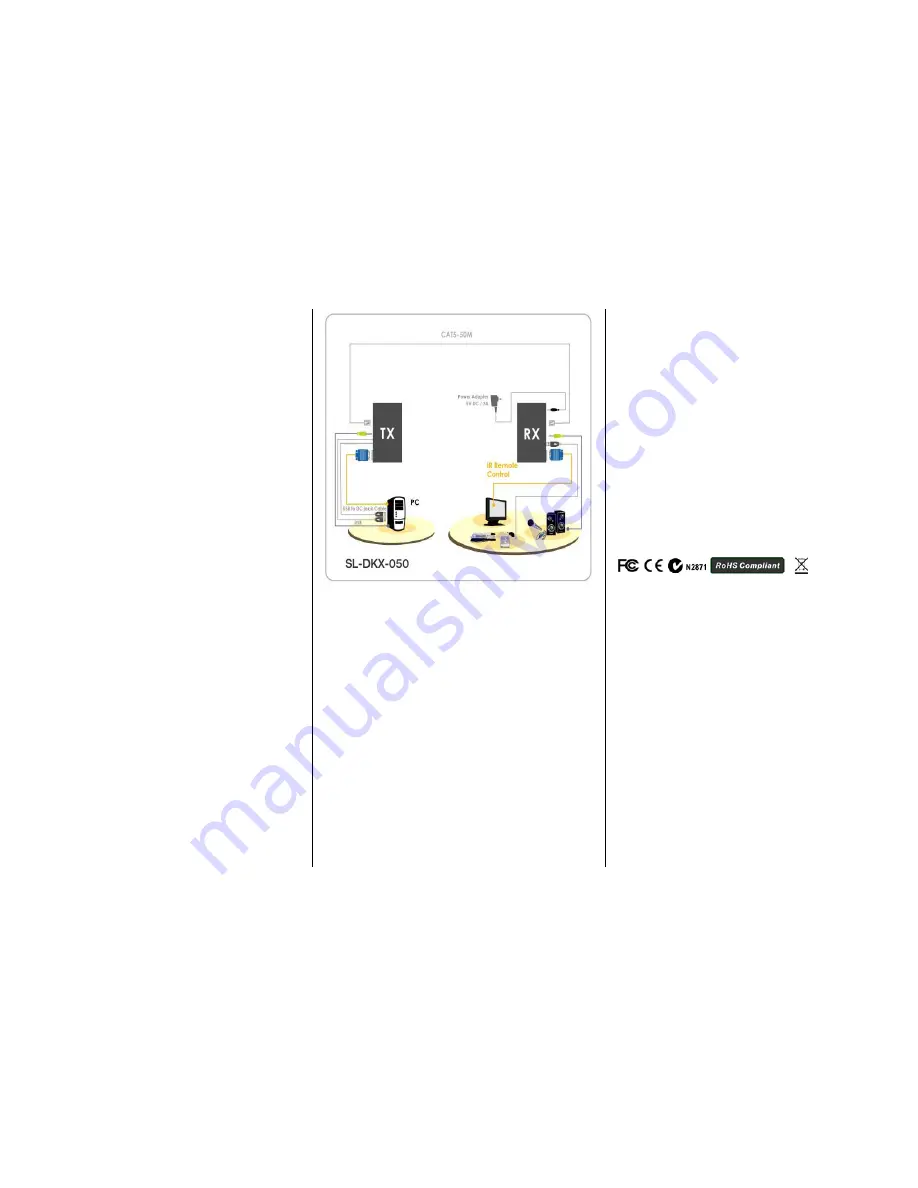
SL-DKX-050 ServerLink DVI KVM Extender over Cat 5 - DVI, USB KB & Mouse, Audio & 1 x USB 2.0 Device up to 50mtr
2
Rev. 1.2 Copyright© All rights reserved.
INSTALLATION
Configure the Transmitter Unit (TX) - Local
Front Panel (TX)
No cable connections required.
Back Panel (TX)
1.
Connect one CAT 5 or CAT 6 cable to the Transmitter
RJ45 port A (
e
) and a 2nd Cat 5 or Cat 6 cable to the
Transmitter RJ45 port B (
f
)
2.
Connect the Transmitter’s DVI port (
c
) to the computer’s
DVI output port using the included DVI cable
3.
Connect the Transmitter’s USB port (
d
) to the
computer’s USB port using the included USB cable
4.
Connect the USB to DC Jack cable to the Transmitter to
power it up (
g
)
Configure the Receiver Unit (RX) - Remote
Front Panel (RX)
1.
Connect the Microphone to the microphone jack (
3
)
(Optional)
2.
Connect the Line-in cable to the Line-in jack (
4
) (Only
when recording required.(Optional)
3.
Connect the speaker to the stereo audio jack (
5
)
(Optional)
4.
Connect a USB keyboard (
6
) and a USB mouse (
7
) to
the USB ports
5.
Connect a USB 2.0 Device (
8
) (Optional)
Back Panel (RX)
1.
Connect the DVI monitor to the DVI output port (
9
)
2.
Connect one CAT 5 or CAT 6 cable to the Receiver
RJ45 port A (
11
) corresponding to the Transmitter A
3.
Connect a 2nd Cat 5 or Cat 6 cable to the Receiver
RJ45 port B (
12
) corresponding to the Transmitter B
4.
Connect the AC power adapter to the Receiver to power
it up (
13
)
5.
If the remote monitor is blank or intermittently blank,
adjust the EQ (Equalizer) rotating switch (
10
) as needed
until a stable display is achieved
TROUBLESHOOTING
Q:
I have connected all the cables correctly and powered on
the extender, however the monitor doesn’t display any video
image. How can I solve this problem?
A:
If you encounter no video display, please adjust the
Receiver Unit’s EQ (Equalizer) rotating switch until a video
image is displayed.
Notes:
1. Use good quality CATx UTP cable (max. 50mtr). Note that
good quality cable will give better video outcome over a
longer distance.
2. The choice of path of the CATx UTP cable should not only
take into account the shortest possible path, but also one
that is relatively far away from any significant
electromagnetic interference source.
FCC
This equipment has been tested and found to comply with Part
15 of the FCC Rules. Operation is subject to the following two
conditions:
(1) This device may not cause harmful interference
(2) This device must accept any interference received.
Including interference that may cause undesired operation.
CE
This equipment is in compliance with the requirements of the
following regulations: EN 55 022: CLASS B.
C-Tick
This equipment is in compliance with ACMA’s Electromagnetic
Compatibility (EMC) regulatory arrangements under the
Radiocommunications Act 1992.
RoHS
All contents of this package, including products, packing
materials and documentation comply with RoHS.


